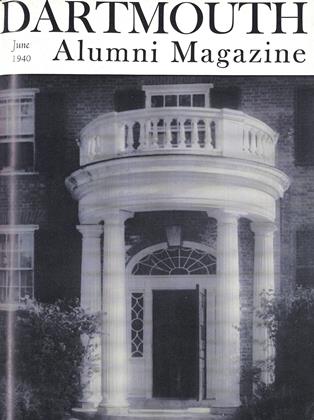by Fred LewisPattee 'BB. D. Appleton-Century Company,New York, 1940. p. 339. $3.00.
IT HAS INDEED been a great pleasure to read this scholarly and amusing book written by my distinguished old friend and teacher. More power to you, sir!
Dr. Pattee, though in his seventy-seventh year, has lost none of his forthrightness, his critical acumen, and his sense of humor, all of which are fused here to produce a lively and readable book. If there is anyone living in America who knows more about American literature than Professor Pattee I should be glad to know his name.
The "fervid, fevered, furious, fatuous, fertile, feeling, florid, furbelowed, fighting, funny" fifties are here dissected and judged most tolerantly and sagely with an insinuating kind of scholarship that comes only with mellowed learning.
The "fifties" produced such phenomena as Whitman's Leaves of Grass, Melville's MobyDick, Ten Nights in a Bar Room, Fern Leavesfrom Fanny's Portfolio (which sold 70,000 copies), Susan Warner's The Wide, WideWorld which became the first best seller in American fiction, Uncle Tom's Cabin, which in 1852 sold a million copies in England alone, Jenny Lind, the Atlantic Monthly, which first appeared in 1857, the American epic Hiawatha, the Fugitive Slave Bill of which Emerson wrote: "The filthy enactment was made in the nineteenth century, by people who could read and write. I will not obey it, by God!", the American tours of Dickens and Thackeray, the Fox sisters, and Phoebe and Alice Cary.
As Dr. Pattee well says, "When an abuse reaches the emotions of the people it is doomed," and the fifties was an emotional period during which many abuses, including slavery, heard their death knell. Here is the period distilled in all its gaudy and amusing character. Read and admire!
 View Full Issue
View Full Issue
More From This Issue
-
 Article
ArticleGordon Ferrie Hull
June 1940 By STEARNS MORSE PROFESSOR OF ENGLISH -
 Article
ArticleIn Reply to Mr. Qua
June 1940 By Judicial Temperament, JOHN G. GAZLEY -
 Sports
SportsBig Green Teams
June 1940 By Whitey Fuller '37 -
 Class Notes
Class Notes1915*
June 1940 By CHARLES R. TAPLIN, RUSSELL B. LIVERMORE -
 Class Notes
Class Notes1931*
June 1940 By CHARLES S. McALLISTER, CRAIG THORN JR. -
 Class Notes
Class Notes1930*
June 1940 By ALBERT I. DICKERSON, G. WARREN FRENCH
Books
-
 Books
BooksBriefly Noted
FEBRUARY 1967 -
 Books
BooksCATHEDRAL PRANCE
JANUARY 1932 By Francosi Denoeu -
 Books
BooksFIELDS OF GRACE.
APRIL 1973 By JOHN HURD '21 -
 Books
BooksSCRAMBLED EGGS SUPER.
May 1953 By Maude D. French -
 Books
BooksLooking Out for #1
September 1980 By R.H.R. -
 Books
BooksCOLLECTIVE BARGAINING COMES TO THE CAMPUS
November 1973 By ROBERT M.MACDONALD

